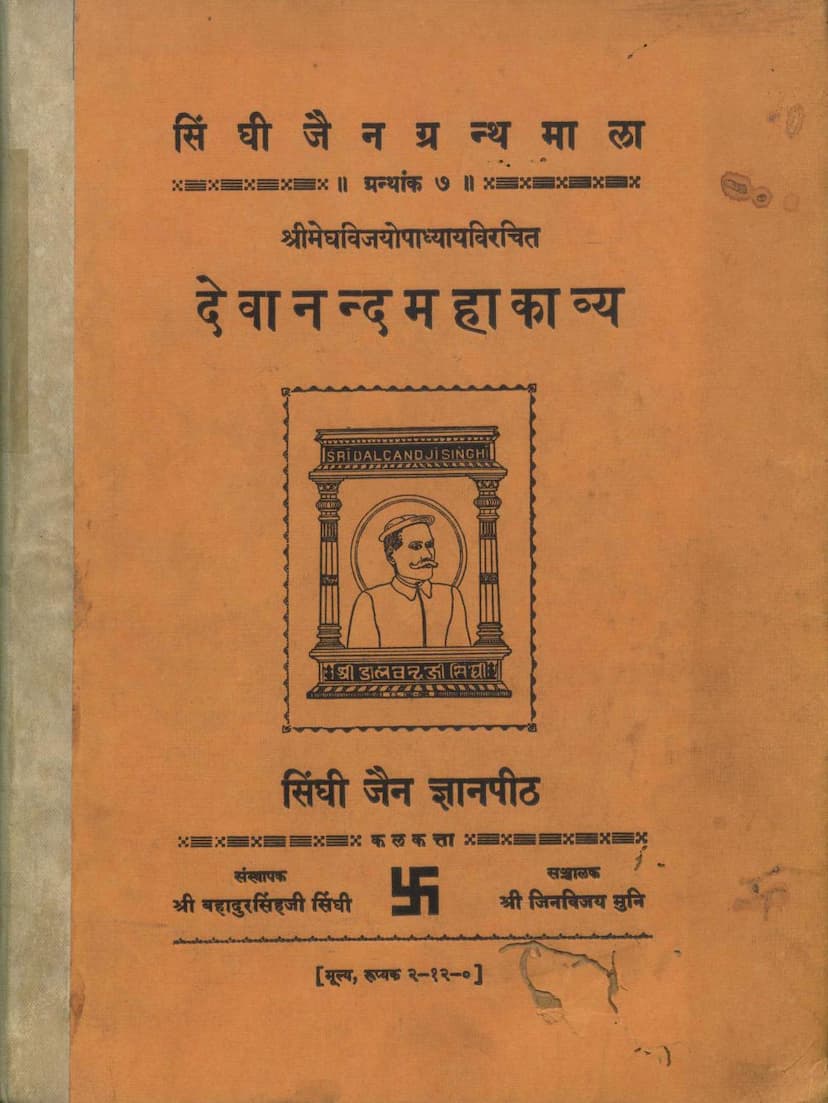Devananda Mahakavya
Added to library: September 1, 2025

Summary
Here's a comprehensive summary of the Jain text "Devananda Mahakavya" by Meghvijay, based on the provided pages:
Book Title: Devananda MahakThis Kāvya (Devananda Mahakavya) Author: Shri Meghavijayopadhyaya Editor: Pandit Bechardas J. Doshi Publisher: Singhi Jaina Granthamala, Ahmedabad-Kolkata
Overview:
The Devananda Mahakavya is a significant work of Jain literature, composed in Sanskrit by the learned Jain monk and scholar Upadhyaya Meghvijay. This epic poem, presented in the Mahakavya style, recounts the life and deeds of Shri Vijayadev Suri, a prominent and influential Jain Acharya of the 17th century. The work is structured into seven sargas (cantos) and is notable for its poetic artistry, particularly its use of samasyapurti (completions of verse prompts), drawing from the renowned Sanskrit poet Magha's Shishupal Vadha.
Key Features and Content:
- Samasyapurti: The Mahakavya is primarily based on completing verses from Magha's Shishupal Vadha. The editor, Pandit Bechardas J. Doshi, has meticulously identified the source verses from Magha's work and provided detailed notes on these connections and textual variations.
- Narrative Focus: The poem centers on the life of Acharya Vijayadev Suri, highlighting his spiritual journey, his influence, and his contributions to Jainism. It also touches upon the lives and contributions of his predecessors, particularly Acharya Hiravijaya Suri and Acharya Vijayasen Suri, renowned for their interactions with Mughal emperors like Akbar and Jahangir.
- Historical and Social Context: The Mahakavya offers insights into the socio-religious landscape of India during the Mughal era. It describes the reverence accorded to Jain Acharyas by rulers and the general populace, and the principles of Jain conduct, including strict adherence to vows, asceticism, and compassion.
- Poetic Style: Meghvijay demonstrates considerable skill in Sanskrit poetry, employing various meters and employing rich imagery and rhetoric. The samasyapurti aspect further showcases his prowess in adapting and expanding upon existing literary traditions while infusing his own narrative and philosophical depth.
- Scholarly Editing: The critical edition, prepared by Pandit Bechardas J. Doshi, includes extensive notes, a biographical introduction to the author, a simplified Hindi summary, and an index of special names mentioned in the text. This editorial effort makes the work accessible to a wider audience, including those less familiar with classical Sanskrit.
Shri Vijayadev Suri's Life as Depicted:
The Mahakavya portrays Vijayadev Suri as a pivotal figure, often considered the last truly influential and dynamic Acharya in Jainism. His life was marked by:
- Asceticism and Devotion: The poem details his rigorous ascetic practices, unwavering devotion to Jain principles, and his detachment from worldly pleasures, even in the face of royal and societal influence.
- Influence and Reverence: It highlights his spiritual authority, which commanded immense respect from kings, maharajas, and wealthy patrons. His teachings and conduct deeply influenced those around him.
- Scholarly Acumen: Vijayadev Suri was a profound scholar, and the poem subtly reflects this through its philosophical discussions and poetic expressions.
- Interactions with Royalty: While the primary focus is on his spiritual life, the narrative also alludes to the historical context of his era, hinting at interactions with the Mughal court, similar to his predecessors.
- Succession and Legacy: The poem touches upon his role in leading the Jain monastic order and his spiritual lineage.
Author's Background (Upadhyaya Meghvijay):
Upadhyaya Meghvijay was a distinguished monk belonging to the Tapa Gaccha lineage. He was a disciple of Acharya Vijayprabh Suri and was honored with the title of Upadhyaya. His works demonstrate a deep understanding of grammar, spirituality, and literature. He is known for composing several other significant works, including Matrukaprasad, Chandprabha (a work on grammar), and Saptasandhana Mahakavya. The Devananda Mahakavya itself was composed in 1727 Vikrama Samvat (approximately 1670 AD).
Publisher and Patronage:
The Mahakavya was published as part of the prestigious Singhi Jaina Granthamala, founded by Shri Bahadur Singhji Singhi in memory of his father, Shri Dalchandji Singhi. This series is dedicated to publishing important Jain canonical, philosophical, historical, and literary works in various ancient Indian languages, contributing significantly to the preservation and dissemination of Jain knowledge.
Significance of the Work:
The Devananda Mahakavya is valued not only for its poetic excellence and its contribution to the hagiography of Jain Acharyas but also for its preservation of ancient Jain traditions and its portrayal of the religious and cultural life of India during a significant historical period. The detailed critical edition makes this valuable text accessible to scholars and practitioners alike.